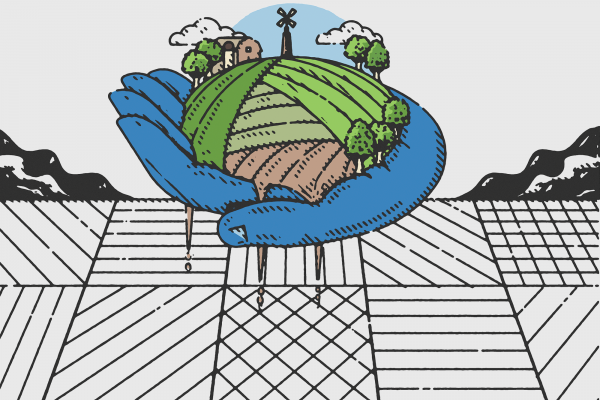THE COVID-19 CRISIS has intensified food insecurity and hunger globally and exposed the failings of a profit-driven, industrialized agriculture and food system.
In August, an alliance of more than 500 African faith leaders and smallholder farmers delivered a strong message to the Bill and Melinda Gates Foundation: “The Gates Foundation’s support for the expansion of intensive industrial scale agriculture is deepening the humanitarian crisis.”
Faith communities and farmers want the Gates Foundation to stop funding the so-called “green revolution technologies” through the Alliance for a Green Revolution in Africa (AGRA). African faith leaders are witnessing the negative impact of industrialized farming to the land and the well-being of their communities. They are calling for a shift to sustainable and agroecological farming that works in local contexts for people and does not harm the land.
AGRA was founded in 2006. Since then, the alliance has received about $1 billion in donations—two-thirds came from the Gates Foundation, according to Timothy Wise, senior adviser at the Institute for Agriculture and Trade Policy. African governments, driven by AGRA’s influence, have created tariff agreements and tax incentives that subsidize large agribusiness and worsen the crisis.
For the past 15 years, AGRA has restructured seed laws to favor a limited range of genetically modified “certified seeds” owned by corporations, which require inorganic fertilizers, must be repurchased for every planting, and force monocropping. Coercing communities to embrace industrial farming through seed and other policy changes at the national government level is not a solution to poverty.
In Africa, 80 percent of “noncertified” seed comes from millions of smallholder farmers who recycle and exchange an “open-source knowledge bank” of fertile seeds. Industrialized farming undermines Indigenous knowledge and community traditions, such as the saving and sharing of seeds.
AGRA was founded on a promise to meet certain anti-poverty benchmarks by 2020. Data from AGRA’s target countries, however, shows no significant alleviation of poverty. In fact, according to Wise, data shows a 30 percent increase in food insecurity.
As people of faith, we believe philanthropic efforts should fund initiatives that work with local communities to ensure self-determination. In this case, smallholder farmers should be able to secure land tenure and have a real stake in the agricultural policy negotiations that impact them.
People in Africa are often depicted as poor and without resources, but concepts such as agroecology, permaculture, and organic farming are in line with traditional customs and African wealth in the form of cultural and ecosystem knowledge.
Busisiwe Mgangxela, an agroecological farmer in South Africa, says, “Agroecology allows us to plant a variety of crops, using organic fertilizers to feed the soil and natural pest control methods. ... Industrial agriculture removes the nutrients from the soil, affecting our ability to produce good crops. We need to focus on sustainable production and consumption in our efforts to mitigate climate change.”
Around the world, farm communities face climate challenges first. In India, smallholder farmers and agricultural workers have led sustained protests on these same issues. Investment is critical for small-scale farmers who are building socially just and ecologically sustainable alternative food systems. The Gates Foundation puts its full faith in technological fixes divorced from morality or local knowledge, which leads to a dominance of multinational corporations over African-led food production systems.
The United States is not removed from these same threats. In 2017, Bill and Melinda Gates (who divorced in August) became the largest private owners of farmland in the U.S., according to the agricultural trade magazine Land Report, topping the chart with an estimated 242,000 acres.
If global food systems are to become sustainable, then input-intensive crop monocultures and industrial-scale feedlots must become obsolete. Despite the Gates Foundation slogan “All lives have equal value,” the needs of the poor and the Earth are not met by AGRA’s failed “green revolution.”

Got something to say about what you're reading? We value your feedback!








